#better call saul meta
Note
do you think walter white x saul goodman could happen
Bahahahaha no.
No.
For a thousand reasons.
But I guess let's get into the heart of it of why it would never, ever, work.
Walter is too Reminiscent of Chuck
They're different but Chuck and Walter have a lot of the same personality traits and toxic flaws. Chuck is an upstanding man who prides himself on the law (in a way Walter of course does not) but they both have a pervasive need to be the smartest in the room and are very intellectually threatened.
Like Chuck, Walter is all about manipulation, caustic barbs, and cutting down those around him.
Saul can handle him as a high maintenance client (until of course Walt gets too high maintenance) but it's not shocking to me they never form even a friendship for all Walter keeps the man on retainer.
He's not the sort of person that Saul would ever be looking for.
Walter Just Doesn't Get Saul or Like Him
Then we get to Walter.
Walter comes to appreciate Saul's connections and abilities but he doesn't like the man and doesn't really get him. He doesn't like Saul's personality (or what he sees as the faux charismatic lawyer), his colorful metaphors, and generally prefers to speak to him as little as possible.
Even when they're not at odds, they clash, as Saul doesn't understand why Walter's so driven by pride (such as during the donation scheme and not laundering the money), and Walter in turn loathes this sleaze with no principles.
Walter both doesn't like Saul and doesn't want to like Saul.
And he wouldn't be much better with Jimmy McGill who he'd view as a cheap, unimpressive, lawyer who didn't even go to law school properly.
#breaking bad#breaking bad meta#breaking bad headcanon#better call saul#better call saul meta#breaking bad shipping#better call saul headcanon#walter white#saul goodman#jimmy mcgill#walter white/saul goodman#anti walter white/saul goodman#anti walter white#meta#headcanon#opinion#shipping
55 notes
·
View notes
Text
Saul Wrong?
I have many controversial BrBa/BCS opinions, but the one that I always come back to is that Saul Goodman worked way better as a comic relief supporting character than as a protagonist of his own show.
I actually found him more likeable when he was an unapologetic sleazebag, it was when they tried to make me feel sorry for him in his own show that I lost sympathy. His pathological criminality brings out my inner Howard/Chuck, I guess. It's like....dude...why are you like this? And I don't necessarily feel like the show does a very good job of explaining it. At a young age he sees his father getting taken advantage of by conmen, and apparently accepts the (deeply morally cynical) attitude that the world is separated into hustlers (wolves) and marks (sheep.) His parents seem to have been totally normal people for whom he felt affection but no respect, because he can't stand rubes, and that's what they were. His brother Chuck is not a rube and is the family member whose affection and respect Jimmy seems to covet the most, though it's not clear whether he has any awareness that the very quality that makes his brother's esteem worth having (his commitment to an objective standard of morality—the fact that he can see through Jimmy's bullshit) is the one thing that prevents them from understanding one another.
Somehow the fact that Walt lived a (basically) normal life until his cancer diagnosis, and everything he does is predicated on his awareness of his own mortality, makes the character's moral fall from grace...more understandable to me? He obviously has a bunch of bottled up petty resentments and a sense of having wasted his potential, but I find his pathology way more coherent than Jimmy/Saul's. I think this is really because he was always the main character of a show, and Saul got a gigantic retconned deep backstory for the spin-off which, while enjoyable, was very obviously not the point of that character when he was created. BCS had to answer the question, "why would someone become like this?" but I wonder if there really is a particularly satisfying way to explain why a comic relief criminal lawyer would choose to work with a person like Walt.
I think BrBa did a better job of showing how Walt self-justifies his awful behavior (compartmentalization, projection, guilt) but Jimmy/Saul seems to have something missing (a sympathy chip? He's capable of feeling compassion for people he relates to, but no sense of seeing value in any abstract principle.) Why are you so obsessed with breaking the rules, dude? His brother is basically correct in their final conversation when he assesses Jimmy as behaving like a child who refuses to acknowledge the consequences of his actions beyond how they hurt him. Every moral consideration is made in terms of his subjective feelings. Him feeling entitled to a high-profile job at his brother's law firm when his brother had to bail him out of serious legal problems is really kind of insane.
Maybe the real problem for me is that Walt is obsessed with gaining respect and Jimmy is obsessed with being liked, and at the end of the day as a motivation for villainy in a man, I.....kind of find the latter more pathetic than the former.
#breaking bad#better call saul#saul goodman#jimmy mcgill#walter white#breaking bad meta#better call saul meta#this isn't exhaustive but i've been thinking about this for awhile#even the courtroom scene with kim just reads as him wanting her to not hate him#i will give him credit for admitting he is responsible for his brother's death however#i think i might've realized jimmy reminds me of my dead father in not a good way lol#i don't think i have a super high tolerance for really emotionally needy men#with walt at least it's usually played for laughs more than sympathy
13 notes
·
View notes
Text
Great BCS analysis found in the comment section of a Lalo video on YT
Top comment by Sage Seraph in this video (watch it, it's great):
I love Lalo. I feel like Tony Dalton explained Lalo’s character perfectly in an interview. He said something basically along the lines of this: Lalo’s not dumb. He knows playing this game will probably kill him, but he doesn’t care. It really is all a game to him. Whether someone dies or not is not an issue to him. Even his own death isn’t that big a deal. And so in the end he laughs as he bleeds out.
I think the biggest Lalo moment, the one he’ll be most remembered for was 607’s ending. Just the way he walks in there and boom Howard Hamlin dies is so crazy. To Lalo that meant nothing. Howard was just another warm blooded creature that had to be killed because he was in the way of Lalo’s plan. To us though, it meant everything because we came to know Howard over 6 whole seasons. So sad.
Despite Lalo’s death coming a little sooner than expected, I think what happened was surprisingly deep. I’ve thought a lot about this season and the season has been kinda meta when you think about it. Kim and Jimmy are using a cork board and sticky notes to outline their storyline just like the writers of the show. They are acting and getting makeup done, and even directing.
I think the theme that comes from that is that you can’t write your own life. Things keep coming up that ruin their plan until they fix it last minute. This culminates in the worst thing going wrong that they can’t fix, Lalo Salamanca walks in the door.
Gus and Lalo are also a part of this meta story. Lalo and Gus are both trying to tell stories to each other and to the cartel. Lalo has been filming Gus. So the question is, how exactly is Gus to beat Lalo and get his false story told? Well, paradoxically it’s by telling the truth. That’s the most entertaining story for Lalo. So this is what Gus does. He tells him exactly why he does what he does. The mask fully comes off. And this is exactly what gives Gus the ability to beat Lalo.
And where did Gus learn this from? Nacho. It was how Nacho died that made Gus realize that just telling the truth about who you are is the most compelling story. That’s the move that makes Gus win. Not the Gun and the cable. Lalo never had that depth of character and so he wants to hear Gus’s honesty so badly. So in the end, what killed Lalo was actually getting what he wanted as he says “I just wanna hear what happened.”
Truly the truth is the most compelling story of all.
#lalo salamanca#better call saul#better call saul meta#bcs#bcs meta#long post#I just thought this was great
46 notes
·
View notes
Text
rewatched s3e10 lantern last night and maybe this is already obvious to everyone but there sure are a lot of hector-chuck parallels in that episode!
firstly, when they feel that their positions of power are threatened (chuck with howard’s urge for him to retire, hector when gus gains control of all shipment), both claim they built their respective businesses alone, demonstrating their considerable egos:
-chuck tells howard that howard’s dad was ‘working in a two-room office before he met [chuck]’ or something along those lines.
-hector says something similar to bolsa about how the salamancas alone built the cartel and yet they are ‘treated like dogs.’
also, both suffer an attack / intensification of their pre-existing illness after a betrayal:
-for hector, he has a heart attack after nacho switches his pills (to protect his father).
-chuck suffers a relapse in his mental illness after the stress of arguing with both jimmy (who humiliated chuck to protect kim) and howard (who ‘humiliated’ chuck to protect the firm).
then, chuck dies after setting fire to his own home, while hector falls into a coma which is sort of a metaphorical or temporary death.
obviously these two men are very different - chuck is a pillar of the legal community of New Mexico, while hector is a pillar of the cartel - but this episode really works to parallel them and to play those parallels off each other!
i’d love to hear people’s thoughts re: what these parallels say about nacho, howard, jimmy, and kim, since they are the inciting factors to these events.
#better call saul#hector salamanca#chuck mcgill#huck or chector what’s the ship name guys#something something their power makes them larger than life but it also inflated their egos so their falls from power were very painful#and had a lot of fallout for the people around them#better call saul meta#also this goes without saying but obviously chuck is a MUCH better person than hector despite these parallels!!
8 notes
·
View notes
Text
youtube
I mayyy be working on a gusmax fic (finally!). And therefore, I had to rewatch this scene where Gustavo delivers his monologue about the lucuma tree and the coati to a comatose Hector Salamanca.
It’s one of my favorite Gus moments in all of Better Call Saul. Not just because it’s a rare gem of a glimpse into his childhood and character (I love that we learn that he’s always had something of a sadistic and vindictive streak, and near-preternatural patience). But also because Giancarlo’s performance is just so impeccable and chilling.
I love that it immediately creates a parallel: Hector is a wounded coati, caught in Gustavo’s trap. And his suffering has only just begun…
What’s curious to me on a side note is how cruel Gustavo is to Nacho after his attempt on Hector’s life. Clearly, he’s angry, because he wants to be in full control of everything at all times his revenge against Hector. But honestly, the result of Hector ending up paralyzed and trapped in his body like a prisoner, barely able to communicate, is so much crueler even than anything Gus imagined. You’d think he’d be maybe a little grateful to Nacho for that?
I wonder if maybe he’s so cruel to Nacho because he sees echoes of his younger self in him: greedy, ambitious, clever...but lacking his own restraint and patience. Maybe he resents that he sees some of himself in Nacho? Idk...
At any rate, I love this glimpse we get into Gustavo's history and personality. I wish we'd gotten just a little bit more. I've said before that I understand and even appreciate how shadowy and mysterious Gus is. But he's such a compelling character. I wish we got just a few more tastes of his history, or even just his inner life. I'd have killed for a Max flashback, or even just one more conversation like the one Gus has with Mike in Dedicado a Max.
Ok, done rambling. Off to go write a gusmax story at long last...
#gustavo fring#better call saul#better call saul piñata#gus backstory#hector salamanca#nacho varga#max arciniega#better call Saul meta#Youtube
1 note
·
View note
Text
The return of BCS color theory!
I've previously argued that Jimmy's color is all of them, and I stand by that. But out of all of them, yellow is the most prominent.
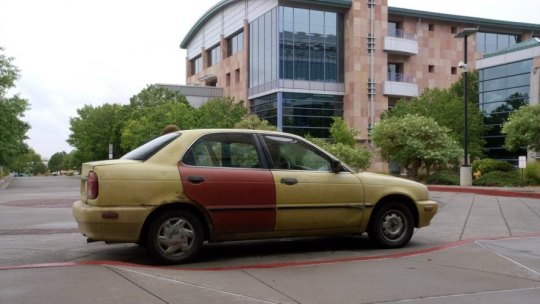

The two most obvious yellows associated with Jimmy are his iconic Esteem and the mug Kim gifted him, both of which have a touch of criminal red.

The Wexler/McGill logo is a mix of Jimmy's yellow and Kim's blue (notice how the office is mostly yellow, because this is Jimmy's dream, not hers.)
So why yellow? Well, it's loud, it's bright, it catches the eye. Jimmy loves to be noticed. But most importantly - it's not red or blue. It's the other primary color! Because in the beginning, Jimmy's not quite criminal red, and not quite lawful blue. He's in his own category.

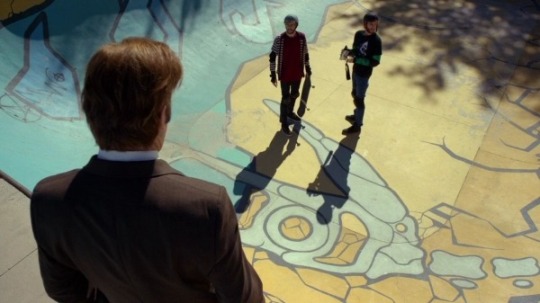
In 1x01, there's yellow lighting in Jimmy's office (his attempt to play it straight), but there's also yellow when he reveals his Slippin' Jimmy past (notice the blues there, too, as his natural yellow crowds out his lawful aspirations).
What does it mean? I think it means that Jimmy's colorful approach to the law is not inherently criminal. If it was, he'd be red. The implication is that Jimmy could have made it as a legitimate lawyer while still being himself.
And to prove it, here are some shots from 1x05, when he visits Mrs. Strauss for the first time. Everything in her house is yellow - the walls, her furniture, even her teapot (although she herself is dressed in lawful blue.)

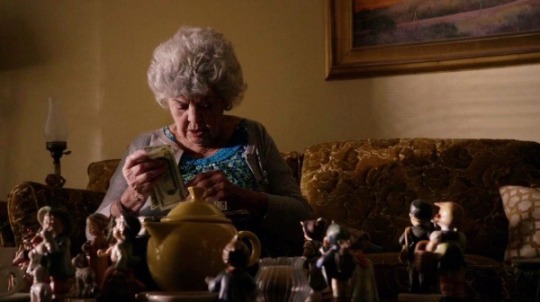
Jimmy the Elder Law Lawyer was perfectly in tune both with his natural colorful nature (his slippin' ways were what uncovered the financial abuse of the Sandpiper residents) and the law. He couldn't cut it in the stifling halls of HHM or Davis & Main. But he could have struck his own path and been happy. In a kinder universe, maybe he did. Alas. :(
276 notes
·
View notes
Text

finally found a way to enunciate my better call saul experience
#my investment in kim is like cerebral and meta based. my investment in jimmy is soooo visceral and emotion driven#like when something bad happens to kim i’m like no but also so interested to see how this impacts her here’s how i think it will here’s wh#and when something bad happens to jimmy (or when he does something bad) im like NO. no . no. you don’t . you don’t do that. gimme him back#is this universal? no clue. we will see#bcs#better call saul#kim wexler#jimmy mcgill#saul goodman#1000
4K notes
·
View notes
Text
Disclaimer this doesn’t mean we’re not allowed to love the show or dick around on the internet ab the show p.s. I’m not the first person to broach this topic p.p.s. I’m white so I’m not the authority on this either but as long as Breaking Bad is having its resurgence I do feel like we ought to just take a moment and acknowledge that yes, Breaking Bad was racist, often, consistently, and at the expense of both its themes and the standards that it set for itself in terms of quality. Like obviously a show shouldn’t need a reason to Not Be Racist other than Not Being Racist but the racism did also make the writing worse. Andrea was the only female character I ever felt that BrBa/BCS did dirty, and specifically in relation to her status as a woman of color. Her death is similar contextually to Jane’s, but unlike Jane, her character is never fleshed out beyond Mother and Girlfriend, and her death doesn’t propel the narrative at all. She is fridged only to pad out Jesse’s misery, as if he hadn’t already been put through enough to evoke the audience’s sympathy ten times over. There was of course the stupid piss-tinted filter they would slap on when the characters were supposed to be in Mexico, the clown car of one-dimensional Latino villains, and while I feel that Nacho’s death served the narrative well, it felt to me at least that he got stiffed on screen time in proportion to the other main characters prior to his being killed off. Also something kind of hypocritical ab having your show act as a deconstruction and condemnation of white masculinity only to then have said show relegate its characters of color to either background fodder or Chick tract villains.
#breaking bad#brba#better call saul#bcs#racism discourse#fandom meta#misogynoir#andrea cantillo#nacho varga#jesse pinkman#jane margolis
605 notes
·
View notes
Text
Galaxy brain take here: I think in many ways, what “Fun and Games” makes very clear is that Saul Goodman’s closest parallel and mirror is actually Gus Fring.
Both men live their lives behind a facade. Saul isn’t Jimmy, and the friendly chicken man isn’t Gus. They exist behind so deep an obfuscation that it’s consumed them and left both with nothing ‘real’. And the question is why do they do that to themselves? With Gus, we learned all the way back in Breaking Bad that he did it because he lost Max. And now we’ve learned Jimmy did it because he lost Kim.
The more I think about it, the more I’ve become convinced that Jimmy views the legal community the same way Gus views the cartel. He despises it. Jimmy’s resentment of Chuck and the massive chip on his shoulder (coupled with festering insecurity) makes him want to break the precious law his brother held so dear. Whether consciously on Jimmy’s part or not (I’m sure it’s partly unconsciously), Saul Goodman is a tool he uses to undermine, humiliate, and chip away at the law, both in general and as a profession, every day. And that sounds a lot like Gus, doesn’t it? Gus, who wants nothing more than to eradicate the cartel that took his soulmate away, so he works for them to corrode it from within.
in the final shot of the episode, Jimmy's coffee cup said "World's greatest lawyer", which simply must be a dark joke on the fact that the "2nd greatest" on the old yellow travel mug no longer applies. Because Kim isn't a lawyer anymore. And now that the only bright spot of the legal world (from his perspective) has removed herself from it, there's no more reason to hold back from burning it to the ground.
The bus-bench lawyer and the chicken man are both compelled to live the rest of their lives behind a mask because they viewed their partners as the only 'real' things about them, and those partners are gone now.
821 notes
·
View notes
Text
kim: apart we're okay
kim when without jimmy: boring missionary sex self loathing florida man partner worst haircut ever sprinklers grey life small talk about mayo
jimmy when without kim: boring empty sex becomes a misogynistic clown and consigliere for a meth lord commits felonies self loathing cinnabon almost kills cancer patient threatens to strangle sweet old lady
#WELL YOU ARE CLEARLY NOT OKAY#even though i would say jimmy did set the bar fucking low there#bcs s6 spoilers#bcs#better call saul#jimmy mcgill#kim wexler#mcwexler#meta
440 notes
·
View notes
Photo

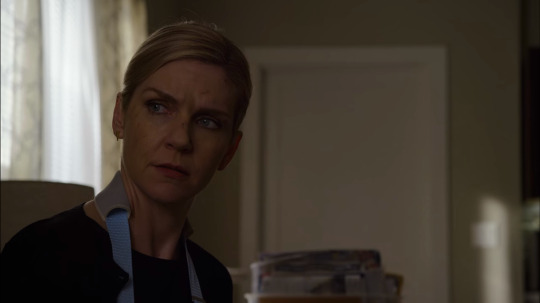
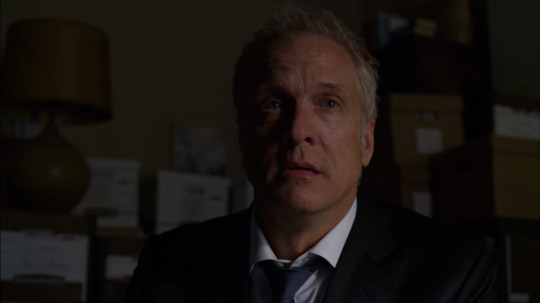
truly the most insane dialogue on this show
#s4 jimmy repression olympics on another level#better call saul#(i still have so many half-written meta posts for s2 and s3 from the rewatch#i'll catch up w them eventually)
497 notes
·
View notes
Note
Since we have some Breaking Bad and Better Call Saul posts here, I want to ask what’s your general opinion on El Camino?
Generally?
It was alright, but by the end, felt like a movie I wasn't actually sure I needed. It was nice to see what Jesse had to go through to get to Alaska, that he does in fact make it, and we get to see how Badger and the gang are faring, but it doesn't really progress the plot or characters in any way.
We get to see snippets of the hell Jesse lived, but we knew that from the show, we get to see his struggles with Walter White, but we knew that from the show. The movie confirms he gets to Alaska, but the show left that as an open possibility for us.
It's not bad, basically, but unlike Better Call Saul, I'm not sure what we gained from having it versus not having it in the Breaking Bad universe. It was just the ability to spend another hour or so with Jesse Pinkman (always a grand time, to be fair).
#breaking bad#breaking bad meta#better call saul#better call saul meta#el camino#el camino meta#meta#opinion
12 notes
·
View notes
Text
I went into BCS knowing that Chuck was an extremely disliked character, so maybe I just had high expectations for him being BEYOND THE PALE horrible but actually watching the show I....really don't get the hate.
A swath of the fandom seems to think he's Walter White-tier bad, and it just leaves me scratching my head. Arrogant, fragile, wounded, a jerk? Yes. A narcissistic sociopath who never loved his brother? Wtf, he's definitely not.
In my mind his narrative function is sort of comparable to Hank's in BrBa. Personally flawed, motivated to take down their respective targets by bruised ego and hurt at betrayal, but also deeply committed to an impartial moral code that refuses to budge, even for a family member. Both characters pay the ultimate price for this.
Every jerkish thing Chuck does has a sympathetic and understandable motive.
How is not wanting your ex-conman brother to work as a lawyer at your firm but being too much of a coward to admit it to his face so you shove off the job on your poor partner "abuse"???
Even his supposed "worst crime" of not telling Jimmy their mother called out his name before she died strikes me as a muddy, gray act, not outright vindictive. It was obviously motivated by complex brotherly feelings of resentment and envy, but you could just as easily read it as Chuck protecting Jimmy and sparing his feelings. What is knowing that the last thing their mother did was cry out for her son who had left the room to grab a sandwich actually going to do for him? Probably just make him feel guilty he wasn't there. We have no indication that Jimmy felt unloved by Ma McGill. Did he really need to know that he was the last thing on her mind before she died? Maybe, maybe not. Frankly, I could see him knowing that making him feel bad for Chuck.
The McGill brothers have a complex, tragic, almost biblical relationship of mutual love and hate, and I feel sorry for all the other people who got caught between them (Ernie, Howard and Kim), but everything negative went both ways and is mutually reinforcing.
In some ways I think my feelings about this are similar to my feelings about Jesse's relationship with his parents. It's tragic that he felt rejected by them and that made him susceptible to looking at Walt as a replacement father figure, but the Pinkmans had completely understandable reasons for distrusting their son and having clear boundaries with him, and everything messed up Jesse did for Walt is not actually their fault. Such is the complexity of life. People are not morally culpable for everything bad that happens as a direct/indirect result of what they do.
To me, what it comes down to with Chuck—it's possible for him to want his brother disbarred for petty personal reasons while simultaneously believing that it's his moral obligation to not give his brother a pass for committing a felony. He can be a jealous prick who also unironically believes that justice is blind. These two things can exist simultaneously.
#better call saul#chuck mcgill#jimmy mcgill#saul goodman#better call saul meta#if jimmy became saul because of his hurt at rejection by chuck that doesn't mean chuck “created” him#maybe it's the age gap but it seems like people watching the show and in universe act like chuck is jimmy's dad#siblings don't have the same obligations to each other as parents do to their children in my mind
30 notes
·
View notes
Photo
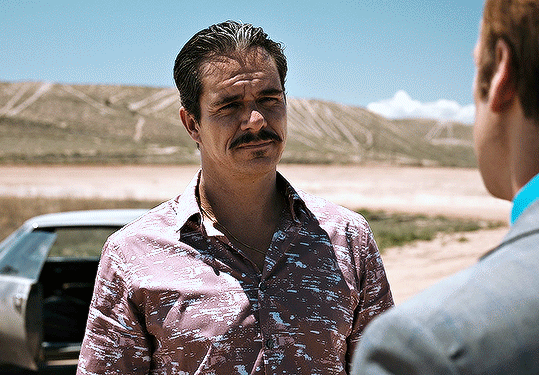

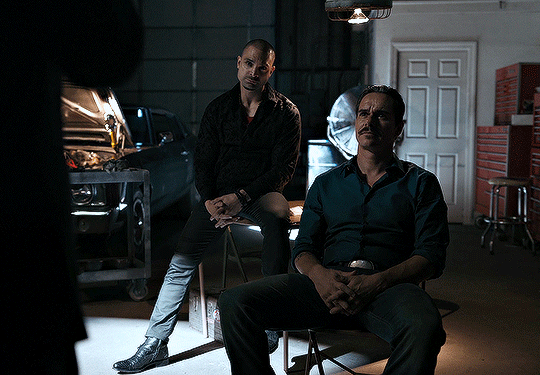
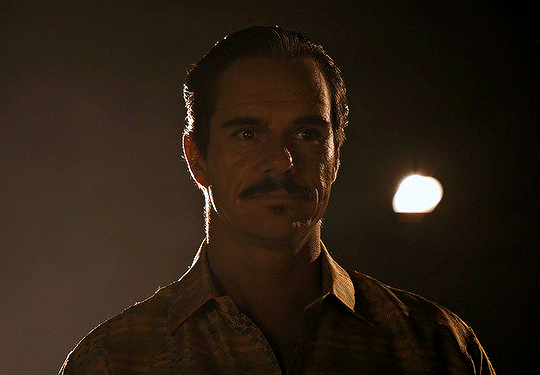


#better call saul#lalo salamanca#tony dalton#myedit#that head tilt#he's cat coded for sure but a case could be made here for dog coding#serious meta
281 notes
·
View notes
Text
something about howard saying 'i think... i'm in the middle of something' and the next shot showing jimmy and kim just like... at the center of the frame. caught in the middle between the legal storyline and the cartel storyline.
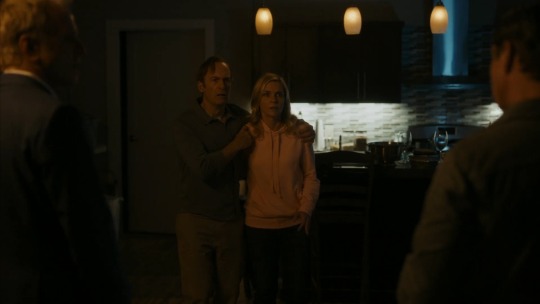
#ranting ranting ranting#also screaming crying rolling on the floor#bcs#better call saul#607#plan and execution#howard hamlin#kim wexler#jimmy mcgill#saul goodman#lalo salamanca#rhea seehorn#bob odenkirk#patrick fabian#tony dalton#meta#rewatch
347 notes
·
View notes
Text
meta/thoughts on BCS
Oh, man. I've never posted meta, or just thoughts on shows before, but I'm trying to give myself permission to be as cringe as I want and to ramble on the internet about the fictional things that I think way too much about. So here goes, my first meta post!
I just rewatched BCS S5E3 "The Guy For This" (let's be real: mostly for thirsty reasons, because I wanted to see Lalo and Nacho looking pretty in the garage scene with Saul) and Goddamn, it just smacked me in the face and reminded me what a pivotal episode it is in so many ways.
One of the many recurring themes that I love to see explored so well in both Breaking Bad and Better Call Saul is the many ways that people deal with (or don't) the consequences of their actions, and this episode is just chock full of that, as well as setting up the first steps down the "bad choice road" or the road ahead for so many characters.
In that garage, Saul really steps into Saul as we know him in Breaking Bad. By taking Lalo's money (even if under duress) he's taking the first step into leaving Jimmy behind and becoming the *criminal lawyer* we all love/love to hate. Jimmy's pattern of avoiding the consequences of his actions or uncomfortable emotions like the guilt over Chuck's disgrace and death is running away: by escaping into his scams, and by literally running away from himself, choosing a new identity--he's not Jimmy anymore; he's Saul, so he doesn't have to lug around Jimmy's baggage. And even though he tries to backtrack from this first step onto the bad choice road leading to him becoming "un amigo del cartel", when he tries to suggest that Lalo find another lawyer, it's too late. As Nacho tells him, "When you're in, you're in."
And Nacho would know! Speaking of running away, Nacho has been trying to evade or escape his problems for so long: first by setting up Tuco to avoid having his side hustle with Pryce discovered, and in this episode, trying to convince his Papa to run away with him to Canada. The scene where Manuel confronts Nacho at his house never fails to break my heart. Nacho is so desperate for Manuel to escape with him to a new, safe life, and Manuel is so adamant that Nacho face up to the consequences of his choices. Which ultimately, he has no choice but to do. He has to confront what he's done and give himself up to save his Papa's life, just like Manuel encouraged him to do so long ago. But by giving up his life rather than turning himself in to the police. It's so damn tragic.
And then there's Kim. She's always running away from the poverty and instability of her past by so doggedly pursuing success as a lawyer. I love how this episode highlights her increasing dissatisfaction with Mesa Verde and her yearning to pursue more meaningful pro-bono work so she can use the law to help people like the little, powerless girl she used to be. The confrontation between her and Mr. Acker is stellar. Kim has this rare moment of vulnerability, letting down her walls to share a story of her childhood struggles with Mr. Acker in a genuine attempt to connect with him, only to have him scoff at her and accuse her of making it up to manipulate him. You can tell his tirade about her being ultimately a selfish person who tries to comfort herself with acts of charity really rankles her because it goes so strongly against her sense of self and represents everything it seems she's afraid of becoming, and so much of what she resents about Howard: the entitlement, the sense of ease and privilege, the self-congratulatory charity acts (don't get me wrong, I really like Howard, pompous as he can sometimes be, but I think this is how Kim views him). By the end of the episode, when she escalates Saul toying with a beer bottle on the balcony into throwing them into the parking lot, you can already see her pivoting and taking those first steps down the road that ultimately leads to the plot against Howard, which she justifies to herself in the name of using the Sandpiper money to fund her pro-bono work. And then in the end of the series, she both runs away AND atones for her actions by moving to Florida and living a life literally leeched of all color and joy, and is just doing penance by living a muted, mediocre life.
Domingo's arc in this episode is so crucial, too! Lalo and Nacho recruit Saul to feed him the information to undermine Fring, but when he meets Hank and Steve Gomez in prison, it starts him on the road to transforming from Domingo/Ocho Loco to Krazy 8. Ultimately leaving the cartel (I like to think because of the loss of his friend Nacho) and setting himself up as an independent dealer and even snitching on his own cousin, Emilio; which then leads to his collision with Walt and Jesse.
And the scene with Mike in the bar! The way he's barely holding it together as he tries (not very successfully) to drink away the pain and guilt caused by killing Werner just a few episodes before (S4E9) and is so triggered by the postcard that reminds him of their conversation is so powerful. I just love how he encounters the group of guys who try to intimidate and rob him and he defends himself in this episode, but we later see him intentionally return and seek them out in S5E5 "Dedicado a Max" in an act of self-loathing and roundabout self-harm via taking a beating and not even trying to defend himself.
I'm rambling, but these shows make me litcherally mentally unwell with how fantastically nuanced and textured the writing, acting, visual storytelling, music, everything is! I'm just going to be ruminating on all these many facets of accepting consequences, atoning, and/or running away affects these characters and the arc of both shows and the world they inhabit for the next long while....
#meta#fandom#better call saul#breaking bad#jimmy mcgill#kim wexler#nacho varga#manuel varga#lalo salamanca#mike ehrmantraut#domingo molina#howard hamlin#chuck mcgill
51 notes
·
View notes